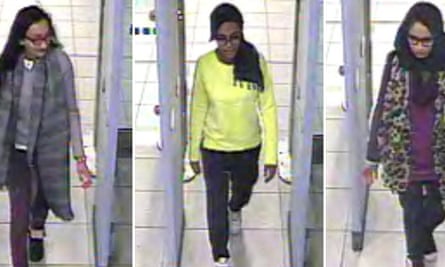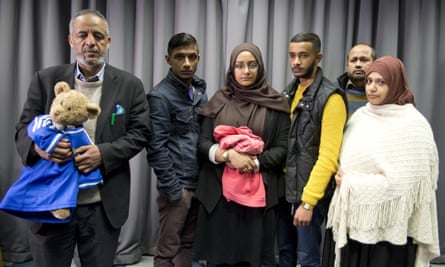The families of three London schoolgirls feared to have travelled to Syria say the police failed to give them crucial information that could have stopped their daughters from joining Islamic State (Isis). They accuse officers of covering up their errors since the girls went missing.
Schoolfriends Shamima Begum, 15, Kadiza Sultana, 16, and Amira Abase, 15, travelled from east London to Turkey last month and then crossed into Isis-controlled areas of Syria.
In interviews with the Guardian, the families of the three girls spoke of the nightmare they have been living through since the girls disappeared and say they had no reason to suspect they had been radicalised. Hussen Abase, father of Amira, said he had been left feeling “like a dead man walking” since his daughter left.
They said they still had no idea where the three girls got the money to buy their plane tickets to Turkey on their journey to the most feared terrorist group in the world.
The families said the police had failed to tell them that a 15-year-old schoolfriend of the girls, who disappeared two months earlier, had gone to Syria to join Isis. Had they known, they say, they would have been alerted to the fact that their children may be in danger.
The families also say police failed to pass them potentially crucial information 12 days before the threefriends boarded a flight for Turkey.

The disappearance of the 15-year-old in December prompted Scotland Yard’s counter-terrorism command to investigate. Pupils were spoken to and seven students were identified as potential friends of the missing girl. Among them were Kadiza, Amira and Shamima although, at that stage, police had found no reason to suspect they were in danger of being radicalised.
Police accept that they wrote letters to the parents saying their children had been friends with the pupil who had gone abroad and asking for permission to take a formal statement. But instead of delivering the letters directly to the parents, police handed them on 5 February to the girls themselves, who hid them in their school textbooks in their bedrooms. The families only found the letters after the girls left on 17 February. Metropolitan police commissioner Sir Bernard Hogan-Howe is expected to be questioned in parliament over the allegations next week by a committee of MPs.
Renu Begum, sister of Shamima, said: “We would have been able to prevent it if we knew there was a terrorism investigation by SO15 [Scotland Yard’s counter-terrorism command]; it would have made us know how serious it was … We were not in the loop, we were kept in the dark.”
The families allege that the police had been given their addresses by the school weeks earlier and say they cannot get answers from the police or school officials about why such crucial information was not passed to them directly.
Hussen Abase said: “The police neglected us, the school neglected us. It would have definitely alarmed me … 100% I would have stopped her. They did not warn us, they did not contact us at all.”
Halima Khanom, elder sister of Kadiza, added: “We did not know how serious the first situation was. Knowing my sister was very close to that girl, if we had known we would have taken steps.”
Halima said her family had been going through hell since the disappearance: “It’s been like a really bad nightmare. I don’t know if we will ever be able to go back to normal.”
Fahmida Aziz, elder cousin of Kadiza, said: “She is the baby of our family;her absence is creating a lot of heart break for everyone in the family.”
Hussen Abase said he still had hopes he would see his daughter again. He said without hope he would be “like a plant without water”.
The three girls were reported missing on 17 February. Scotland Yard launched an international search shortly afterwards. The three took a flight on that day, during the school half-term break, from Gatwick direct to Turkey. Questions have been asked about border controls and about why Turkish Airlines allowed three unaccompanied teenagers on to the flight, seemingly without any suspicion being raised.
The families say there was nothing to alert them that their loved ones were in danger of falling for Isis propaganda. Renu Begum said: “We had no reason to suspect our kids, they were good kids, they were A-grade kids.”
Begum said she searched her sister’s room after the failed to return home. When she found the letter, she feared the worst and immediately called the police. “Alarm bells start going off … Straight away I thought ‘my parents should have seen this’.”
Halima Khanom said she found her sister’s letter “inside one of her textbooks, in a brown envelope. It was a vital bit of information we should have been informed about”.
The girls had been planning their journey for some time. Hussen Abase speculated that the letter might have persuaded the girls to bring forward their plans. He said: “Maybe at that age, they fear to tell us about the letter.”
Keith Vaz, chair of the home affairs committee of MPs, said: “It is extraordinary the police should have handed the letters to the girls themselves. It raises the question of whether the families have been deprived of crucial information they were entitled to receive and added to their anguish.” On Tuesday, Hogan-Howe will be questioned about the case by MPs on the committee.
After the girls disappeared police took the unusual step of launching a high profile appeal for information as they hoped to stop them crossing from Turkey and into Syria.
The police strategy also included highly emotive pleas from the families, and at that stage it seemed both were united.
But the families say they have grown disenchanted and frustrated by the alleged lack of answers to their questions from the police and school and angered by the failure to tell them their loved one’s classmate and friend had months earlier gone to join Isis.
Fahmida Aziz, the elder cousin of Kadiza, said police had been “very manipulative” since the disappearance, adding: “I personally don’t have any faith in the police. They have really failed us.”
The three schoolgirls are believed to have been radicalised at least in part over the internet and to have followed social media accounts linked to Isis. But Halima Khanom said: “I followed my sister on Instagram, there was nothing out of the ordinary.”

The letter from Scotland Yard is dated 2 February, and was handed to the girls three days later. A detective wrote: “I understand your daughter may have known [the missing 15-year-old] as a friend. It is my role to understand [the missing girl] better and the reasons why she has decided to leave this country.
“I am trying to gather information which may help to find her and reunite her with her family. This will help the police and partner agencies to understand and prevent other vulnerable teenagers from disappearing. For these reasons I seek your permission to speak to your daughter.”
“I would like a handwritten statement … and this will cover [the missing girl] and her religious beliefs, lifestyle and the circumstances just before [the girl] left the UK. Please be reassured that I am not investigating your own daughter and they are not under any suspicion of doing something wrong. I am simply after her help.
“With the school’s permission I have introduced myself to your child and explained the above reasons why I need their help.”
It ends by offering a visit in person by the detective and his contact details. Police do not appear to have made further inquiries after they heard nothing from the families of the three girls.
The families say the school told them the letter was handed out at a session where seven pupils were gathered together.
The Met said: “There was nothing to suggest at the time that the girls themselves were at risk and indeed their disappearance has come as a great surprise, not least to their own families.
“The girls were spoken to in December 2014 as part of the routine inquiry by officers investigating the disappearance of their friend. We continue to liaise with the school and local education authority in connection with this ongoing investigation.”
Bethnal Green Academy said it barred access to social media from its classrooms and the radicalisation did not happen on its premises. It did not comment on the new allegations from the families.